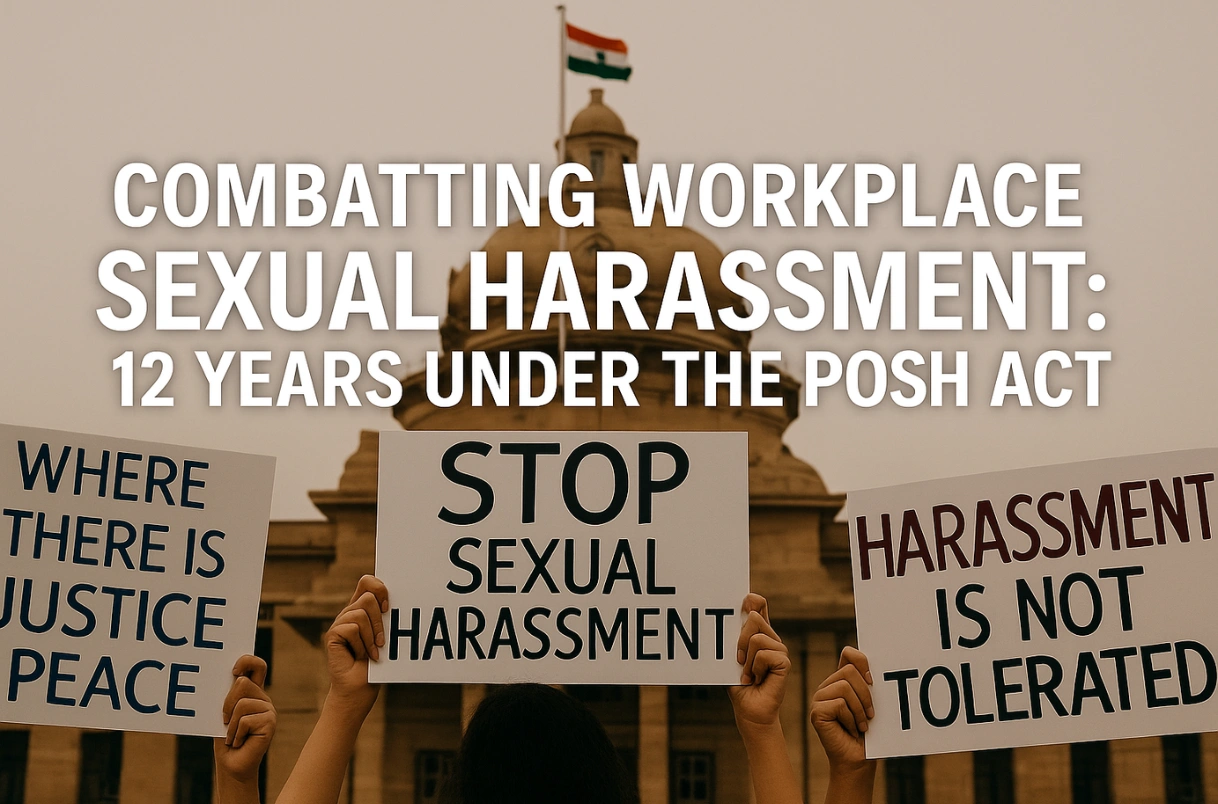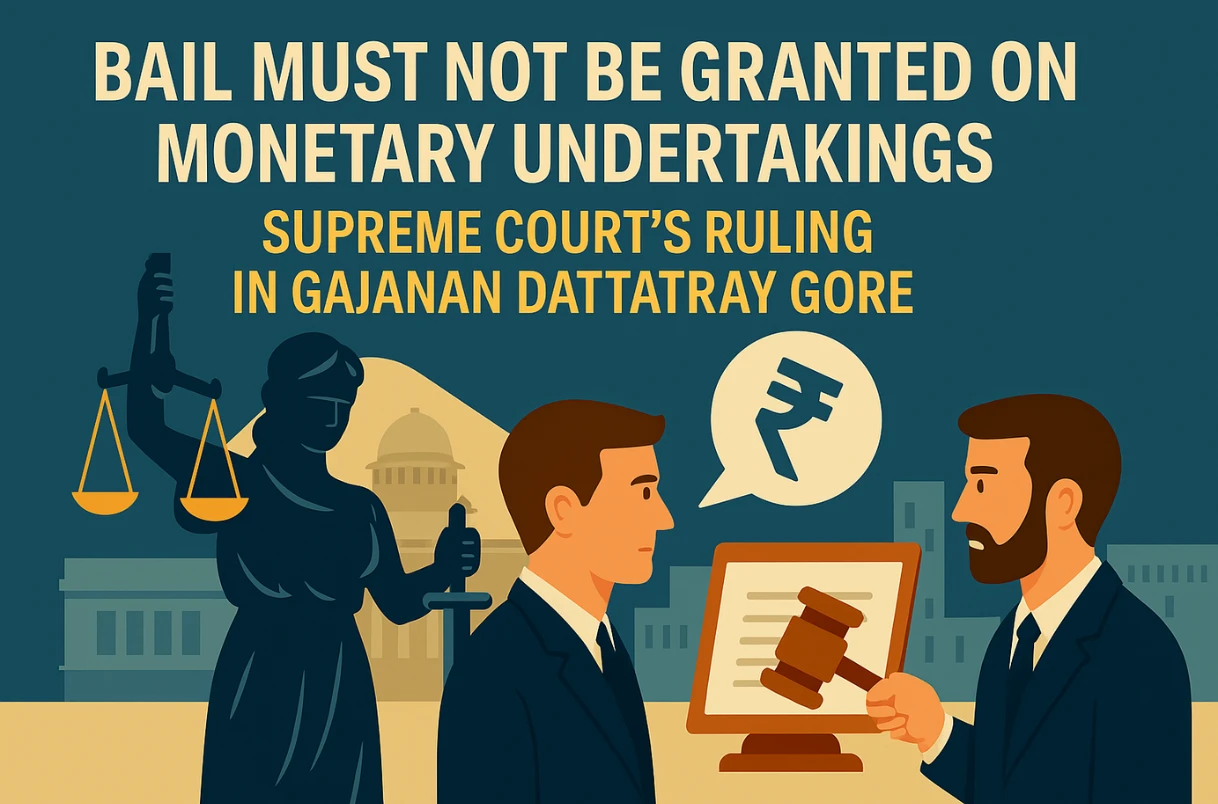POSH Act at 12: Evaluating India’s Framework Against Workplace Sexual Harassment

By – Shreya Dubey and Kaushiki
Table of Contents
Introduction
It has been more than a decade that the Sexual Harassment of Women at Workplace (Prevention, Prohibition and Redressal) Act, 2013- The POSH Act was enacted. The Vishaka1 judgment acknowledging the lack of workplace harassment protection regime in India and highlighted the importance of workplace sexual harassment as a fundamental right under the Constitution. But has the enactment been a mere formality, or has it progressively and comprehensively laid down a robust legal framework to combat sexual harassment at the workplace? Most importantly, has the framework been adopted by organisations in letter and spirit? While the objective of the POSH Act is clear, its practical application is mired with various legal niceties, which has the effect of blunting the effectiveness of the law. This article discusses the hurdles experienced in the implementation of POSH Act.
Understanding the POSH Act Framework
Key Institutional Mandates
The POSH Act broadly explains the concept of sexual harassment, provides for constitution of Internal Complaints Committee (ICC), details the complaint submission process, timelines for completion of inquiry and submission of report by the ICC.
In order to ensure that the proceedings under the POSH Act are carried out in a proper and legally sound manner, before an Inquiry Committee, it mandates the engagement of an external member (social worker / legal expert) to guide the entire process. The ICC is expected to conduct a fair, impartial, and transparent inquiry and submit a well-reasoned report to the employer for appropriate action.
Procedural Ambiguities in Practice
Lack of Codified Procedures
Inquiry reports are often challenged on hyper technical grounds resulting in judicial proceedings that linger for years diluting the very essence of a special inquiry and the very purpose of a fast-track inquiry. A common man’s overview of natural justice is limited to:
- Right to a Fair Hearing
- Right to be Heard
- Rule Against Bias
The Sexual Harassment of Women at Workplace Rules, 2013 (POSH Rules) elaborate on the “Manner of Inquiry into Complaint”. But the simple mandate that the Complaints Committee shall make inquiry into the complaint in accordance with the principles of natural justice often results in legal complexities. There is a lack of defined procedures under the POSH Rules. It has been left to the discretion of the ICC to proceed with an inquiry into a complaint of sexual harassment, as per service rules, if any or in the absence of service rules, in the manner prescribed under the POSH Act.
Judicial Review of Inquiry Process
The procedure prescribed under the POSH Act is restricted to:
- Provision of copies of the complaint to the accused employee along with supporting documents and list of witnesses
- Provision for ex parte decisions if parties fail to appear for three consecutive hearings after proper notice.
- Power of ICC to issue interim orders
- Action after Inquiry
- Recommendations of punishment by ICC c
- Dealing with False or Malicious Complaints
- Right to Appeal
- Penalty for Breach of Confidentiality
It does not provide a step-by-step procedure to be followed, including crucial elements such as the right to cross-examination. More often than not, the accused employee is not permitted to cross-examine the witnesses of the complainant or are even provided with copies of witness statements. The absence of well-defined procedures under the POSH Act and Rules jeopardizes not only the rights of the accused employee but also leads to judicial scrutiny that delays justice for the complainant.
Judicial Safeguards and Guidelines
Case Study: Ashok Kumar Singh v. University of Delhi
Procedural Safeguards from Court
When inquiries are set aside, for failing to have met the elements of fairness and transparency, re-constitution and re-assembly of ICC and retrial of the entire complaint itself is a taxing process, entailing cost, effort and time for the complainant, accused employee as well as the employer.
Strict rules of evidence are not mandatory in inquiry proceedings, and the ICC is afforded the liberty to adopt its own procedure, provided it aligns with the principles of natural justice. There are limited reasons for which courts can interfere with the orders passed by the departmental authorities such as violation of the principles of natural justice, violation of rules of the organization or the law, or where the findings and conclusions of the departmental authorities are perverse or if the punishment is shockingly disproportionate2. However the lack of guidance to a fair inquiry under the POSH Act and POSH Rules is a matter of concern resulting in judicial proceedings.
In some of the recent rulings of the Supreme Court and different High Courts, the courts have expressed serious concern over the failure of ICC to follow the principles of natural justice while conducting inquiries and redressing complaints related to sexual harassment of females.
In Ashok Kumar Singh v. University of Delhi & Ors.3, the Delhi High Court while taking cognisance of the fact that POSH Act does not lay down any specific procedure for conducting an inquiry, including cross-examining the witnesses, has laid down guidelines for conducting a fresh inquiry in the matter:
- The inquiry to re-begin from the stage of cross-examination of the complainant’s witnesses whose examination-in-chief has been tendered in writing to the previous ICC.
- All parties to be intimated about the date and time of proceedings in writing as well as by e-mail.
- Accused to be permitted to cross-examine the witnesses of the complainant through a questionnaire which would be submitted to the ICC at the time when the witnesses are produced for their cross-examination. Accused and Complainant not be present when the complainant’s witness is being examined on the questionnaire. Similar procedure to follow for examination in chief.
- Witnesses to be called one by one by the ICC to answer the questionnaire which is put to them. Witnesses would answer questionnaires in the presence of the Committee.
- Testimony of the single witness to be concluded on the same day on which the recording of the witness cross examination commences.
- Common witnesses to both complainant and accused to be cross-examined in one go, in respect of all the complaints in which he/she is a witness.
- The ICC to endeavours to ensure that the witnesses who are being cross-examined, does not confabulate with the witnesses who are yet to be cross-examined.
- After completion of the cross-examination of the complainants’ witnesses, the accused employee would be permitted to lead defence evidence.
- After completion of the cross-examination of the witnesses, parties to be given a personal hearing by the ICC.
- After consideration of recording of the inquiry and the submissions made by the parties, the ICC shall submit separate reports on each complaint along with their recommendations to the Competent Authority.
- In any case any vacancy in the Constitution of the ICC occurs, the same shall be filled within one week from the date when it has arisen. It is made clear that in such eventuality, the inquiry shall resume from the stage on which the erstwhile member of the ICC had left the Committee.
Need for Legislative Update
The Delhi High Court was compelled to intervene in this case and lay down guidelines, since the prayer of the accused employee for cross-examination as well as opportunity to lead defence evidence, was rejected by the ICC. It was categorically observed by the High Court that ICC’s inquiry violated the principles of natural justice, and a fresh inquiry was necessitated.
Similar directions and observations have been made by other High Courts about lapse in fair procedures before the ICCs.
The Bill on Sexual Harassment of Women at Workplace (Prevention, Prohibition and Redressal) Amendment Act, 20244 addresses the issue of limitation for reporting of sexual harassment complaints, which has been increased from three months to one year. Given the numerous challenges to ICC reports on grounds of improper procedure, it would have been a welcome change if the amendment addressed the issue.
While POSH Act is intended to create a comfortable and safe platform for female employees to report workplace harassment complaints, the principle of equality and fair opportunity to the accused is also implicit in every inquiry including fair opportunity for both parties to present their case, contradicting the evidence, and defending themselves meaningfully. The POSH Act fails to address these procedural aspects and ICCs are not adept to handle complex complaints. ICCs should not be constituted merely to meet compliance requirements, but must be equipped with a sound understanding of the law and the procedures required to conduct inquiries fairly and transparently.
Supreme Court on ICC Fairness
Aureliano Fernandes v. State of Goa
Recently in the case of Aureliano Fernandes vs. State of Goa and Ors5 ,while as many as 17 complaints from students levelling serious allegations of sexual harassment were dealt under an ICC Report, the Supreme Court observed that the mere number of complaints would not be a ground to give a complete go by to the procedural fairness of the inquiry required to be conducted, more so when the inquiry could lead to imposition of major penalty proceedings. The court observed that due process, an important facet of the principles of natural justice, was seriously compromised, due to the manner in which the committee in such case went about the task of conducting the inquiry proceedings and that the undue haste demonstrated by the committee in concluding the inquiry cannot justify the curtailment of the appellant’s right to a fair hearing.
Each sexual harassment case has its unique background; it is necessary for the ICC to be sensitive to complaints of every nature and be equally sensitive to the rights of the accused employee.
With the advent of covid 19 pandemic and switchover to work from home model, trend of online meetings, the nuances of harassment have only multiplied in the form of video call requests, stalking on social media, misuse of social messenger applications. While the level of harassment has become complex and difficult to prove, members of ICC need to stay abreast with such developments to conduct full-fledged inquiries, at par with those conducted for proving misconduct in disciplinary proceedings to ensure that genuine complaints are met with justice and frivolous complaints reach their logical end. A wide range of factors must also be taken into account by ICCs during an ongoing inquiry, including but not limited to:
- Each member of ICC needs to be sensitised with the settled procedures of inquiry by going through reported judgements on sexual harassment or departmental proceedings.
- Preparation towards drafting of inquiry reports- the form, manner and content
- Inquiry reports should necessarily describe how principles of natural justice were followed, opportunities granted to the parties, document minutes of each ICC meetings, reference to evidence tendered by either party including emails/ SMSs/WhatsApp or messenger texts, etc.
- The more detailed the report, the more adequate it will be found.
Since the findings of ICC have significant civil impact on the accused, employers and the ICCs need to ensure that the proceedings are conducted in a fair manner and in compliance with law and the principles of natural justice, since sexual harassment allegations in the workplace also run the risk of loss of employer’s reputation. An elaborate, well conducted inquiry has lesser chances of judicial interference saving time and cost for both the complainant as well as the employer.
UOI v. Dilip Paul
The case of UOI and Ors. Vs. Dilip Paul6 is an eye opener in this regard, where justice to the complainant came to be served 14 years after submission of sexual harassment complaints for the period between 2006 to May 2010 against former DIG in the SSB. A detailed inquiry report dated December 2012 was submitted by the Central Complaints Committee, recommending the dismissal of the former DIG. The officer retired from service before any disciplinary action could be taken up by the Ministry of Home Affairs. Ultimately in 2016, a decision was taken to withhold 50% of his monthly pension on a permanent basis, which Inquiry Report and subsequent Disciplinary Order came to be challenged before High Court. The High Court quashed the penalty, citing that the Central Committee had improperly considered a second complaint not referred earlier, assumed a prosecutorial role during the inquiry, and based findings on conjecture without adequate evidence. The Union of India appealed the High Court’s decision, and the Supreme Court came to examine the procedural fairness of the disciplinary proceedings from the beginning to the end and upheld the procedure adopted by the Complaints Committee for examining the evidence on record. After another half a decade, the Supreme Court in 2023 upheld the decision of the Central Government to withhold 50% penalty on a permanent basis.
Delayed Justice and Procedural Integrity
Therefore, it is imperative that ICC reports are conducted within the stipulated period under the POSH Act and the ICC Report is drawn up after careful evaluation of material on record after affording proper opportunity to complainant witnesses and the accused employee.
Institutional Implementation Gaps
Apart from lack of procedures having been stipulated under the statutory regime, several systemic issues still persist, as have been summarised below:
Structural and Awareness Barriers
- Non-constitution or Improper Constitution of ICCs: Many organisations in non -metro cities have not formed their committees, primarily due to the absence of implementation oversight or enforcement mechanisms. Where ICC’s have been constituted, it often lacks qualified external members or are unable to meet the female strength mandated under the POSH Act, since even the Presiding Officer is required to be a woman employed at a senior level at workplace from amongst the employees.
- Lack of sensitisation towards workplace harassment: The POSH Act mandates the employer to organise workshops and awareness programmes at regular intervals for sensitising the employees with the provisions of the POSH Act and conduct orientation programmes for the members of the ICC. Many employees, especially in unorganized sectors and educational institutions, remain unaware of their rights under the POSH Act.
Operational & Procedural Failures
- Retaliation and Victimization: Fear of professional retaliation continues to deter women from timely reporting incidents.
- Inadequate Training: ICC members often lack training in handling sensitive cases, leading to procedural lapses. Complaints are often rejected on the ground of accused employee being stationed in a different city, which is where the knowledge of judicial precedents on “scope of workplace” plays a significant role.
- Fair opportunity at all stages: Adequate opportunity is to be afforded to the accused employee not just by the ICC, but also by the Disciplinary Authority and the Appellate Authority before taking any action against the accused employee in terms of the recommendations of the ICC.
- Non documentation of ICC Proceedings: Often the Minutes of ICC Proceedings are not recorded and therefore do not find mention in Inquiry Reports, thereby making such reports susceptible to challenge for failing to maintain transparency.
External Harassment and Expanding the Definition of Workplace
- External Harassment case: While the workplace is not restricted to physical internal organisation anymore, challenges arise when women employees face harassment at the hands of third parties, like clients and vendors. Most of such complaints do not come on record due to sheer lack of recognition under the POSH Act and non-cooperation by employers in reporting incidents on behalf of the complainant employee from their own organisation.
Supreme Court Directives on Compliance
While metro cities still report a higher number of cases, true success in implementation will be achieved only when smaller cities and organizations also demonstrate compliance in both letter and spirit. Most small-scale organisations tend to skip the responsibility of fully implementing the POSH Act. In the Aureliano Fernandes case7, Supreme Court has flagged serious lapses in implementation of the POSH Act, and consequently issued the following directives:
Verification and Transparency Measures
- The Union of India, all State Governments and Union Territories directed to undertake a timebound exercise to verify as to whether all the concerned Ministries, Departments, Government organizations, authorities, Public Sector Undertakings, institutions, bodies, etc. have constituted ICCs/LCs/ICs.
- Information regarding the constitution and composition of the ICCs/LCs/ICs, details of the e-mail IDs and contact numbers of the designated person(s), the procedure prescribed for submitting an online complaint, as also the relevant rules, regulations and internal policies to be made readily available on the website of the concerned Authority/Functionary/ Organisation/Institution/Body, as the case may be and updated from time to time.
- Similar exercise to be undertaken by all the Statutory bodies of professionals at the Apex level and the State level (including those regulating doctors, lawyers, architects, chartered accountants, cost accountants, engineers, bankers and other professionals), by Universities, colleges, Training Centres and educational institutions and by government and private hospitals/nursing homes.
- Immediate and effective steps shall be taken by the authorities/ managements/employers to familiarize members of the ICCs/LCs/ICs with their duties and the manner in which an inquiry ought to be conducted on receiving a complaint of sexual harassment at the workplace, from the point when the complaint is received, till the inquiry is finally concluded and the Report submitted.
Training, Awareness, and SOP Development
- Authorities/management/employers to regularly conduct orientation programmes, workshops, seminars and awareness programmes to upskill members of the ICCs/LCs/ICs and to educate women employees and women’s groups about the provisions of the Act, the Rules and relevant regulations.
- National Legal Services Authority (NALSA) and the State Legal Services Authorities (SLSAs) to develop modules to conduct workshops and organize awareness programmes to sensitize authorities/ managements/ employers, employees and adolescent groups with the provisions of the Act, which shall be included in their annual calendar.
- The National Judicial Academy and the State Judicial Academies to include in their annual calendars, orientation programmes, seminars and workshops for capacity building of members of the ICCs/LCs/ICs established in the High Courts and District Courts and for drafting Standard Operating Procedures (SOPs) to conduct an inquiry under the Act and Rules.
Conclusion
While these directives were issued nearly 2 years ago, their implementation is also yet to see the light of the day. The POSH Act is of seminal importance in ensuring the basic and fundamental right of every woman to be protected from sexual harassment at their workplace. However, to what extent this objective is achieved will depend on multiple factors including the proper implementation of the law and its widespread sensitization among employers, employees and members of ICC.
FAQs
-
What is POSH act 2013?
The POSH Act, 2013 is an Indian law that aims to prevent and address sexual harassment of women at the workplace. It mandates the formation of Internal Complaints Committees and provides a framework for redressal.
-
Who are covered under POSH act 2013?
The POSH Act, 2013 covers all women, including regular, temporary, contract, part-time, interns, and domestic workers. It applies to workplaces in the public and private sectors, including NGOs, households, and unorganized sectors.
-
What is the purpose of the POSH Act, 2013?
The purpose of the POSH Act, 2013 is to prevent, prohibit, and provide redressal for sexual harassment of women at the workplace. It aims to ensure a safe, secure, and dignified working environment for women.
-
What is the role of the Internal Complaints Committee (ICC)?
The Internal Complaints Committee (ICC) is responsible for receiving, investigating, and addressing complaints of sexual harassment at the workplace. It ensures a fair, confidential, and timely resolution of such complaints as per the POSH Act, 2013.
-
Why is an external member essential in ICCs?
An external member in the ICC ensures impartiality and prevents internal bias during the inquiry process. Their presence brings independent expertise and credibility to the proceedings.
-
What are the major implementation challenges of the POSH Act?
Major challenges include lack of awareness, inadequate training on employees and ICC members, lack of inquiry procedures being stipulated under the POSH Act and non-compliance in forming ICCs, especially in smaller or unorganized workplaces. Fear of retaliation and stigma also discourage women from reporting incidents.
-
What procedural reforms have courts suggested?
Through various precedents, Courts have framed guidelines for ICC inquiry, stressed on mandatory training, and enforced strict timelines for inquiry. They have also emphasized on protecting complainants from victimization and ensuring transparency in the redressal process.
-
Has the POSH Act been amended recently?
As of May 2025, the POSH Act, 2013 has not been officially amended. A proposed amendment bill introduced in February 2024 suggests extending the complaint filing period from 3 months to 1 year and removing the conciliation process. However, this bill is still pending parliamentary approval and has not become law.
-
What are the criteria’s for initiating a complaint under the POSH Act?
The POSH Act applies when a woman experiences unwelcome behaviour of a sexual nature at a workplace, including physical contact, advances, or sexually coloured remarks. The incident must occur in connection with her employment or during the course of work-related activities.
-
What is the punishment for non-compliance under the POSH Act?
Under the POSH Act, an employer can be fined up to ₹50,000 for non-compliance, and repeated violations can lead to higher penalties or license cancellation. Individuals found guilty may also face disciplinary action or prosecution under relevant criminal laws.
References
- Vishaka v. State of Rajasthan (1997) 6 SCC 241
- Gaurav Jain v. Hindustan Latex Family Planning Promotion Trust and Ors. (2015 SCC OnLine Del 6489)
- 2017 LLR 1014
- Introduced in the Rajya Sabha on 02.02.2024
- Judgement dated 12.05.2023 in Civil Appeal No. 2482 of 2014
- (2023) SCC Online SC1423
- Supra


